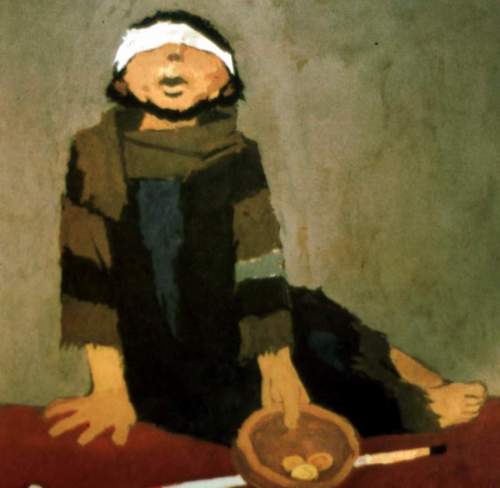Reading the Gospel of Mark these last few weeks, you get the impression that Jesus’ disciples are rather dense, like wood. How can they never understand what he is telling them? Jesus explains to his disciples that he is headed toward a confrontation of death and betrayal–his disciples argue about which one of them is the best disciple. He tells them that one who serves is most important in his Kingdom; the disciples look for seats of power and authority. No matter what Jesus says, they just don’t seem to get it.
Today, as if to break up the monotony of that theme, we get the story of someone who does get it. Not a follower of Jesus, he nonetheless recognizes who Jesus is and what he is about. Ironic that the person of such deep insight is blind. Bartimaeus, the blind beggar, presents the perfect example of discipleship. How he came to such awareness is not explained. Told that Jesus of Nazareth is coming, Bartimaeus recognizes Jesus deserves a different title. “Son of David,” he calls Jesus, a title meant only for the messiah, a title that Jesus will claim when he rides into Jerusalem in Palm Sunday triumph. Even more impressive, Bartimaeus understands what Jesus means by that title. After he is healed, Jesus tells the now-seeing Bartimaeus to go, just as he has told so many others after healing them. But Bartimaeus doesn’t go his own way, instead he chooses to follow Jesus on the way, and there’s only one way for Jesus to travel. Jesus is headed for the final confrontation in Jerusalem.
What is it that distinguishes Bartimaeus’ insightful faith from the disciples’ stubborn inability to get it? The main difference I see is that Bartimaeus has nothing to lose. A beggar, his life isn’t going anywhere fast, why not take a chance on trusting Jesus and believing? The disciples come from a different place in their struggle to live by faith. True, they have all given up life as they knew it in order to follow Jesus. But that sacrifice shapes their problem. How can they go back to fishing boats and tax collecting, back to families and friends with questions and opinions? “So, John,” they’d say, “how’d that Jesus thing work out for you? Wasn’t he supposed to be the messiah? Isn’t that what you said? Weren’t you going to take over Jerusalem? What happened?”
No, they can’t go back. Failure is not an option. So they go forward, following Jesus, knowing that he is the messiah, trusting that he is absolutely the one sent by God to bring salvation–while not understanding or believing anything he says. Does that make sense or is that sort of mental gymnastics too much? Is it possible to be both a devoted follower of Jesus and oblivious to his message?
Yes. Don’t kid yourself; this world is not safe. There are indeed possible futures we want to avoid, and what will happen in the future is always an open question. But do Christians have anything else to bring to this devastating picture? When the worst happens–the election is lost, the diagnosis comes back, job ends, relationship unravels–what difference does it make that we follow Christ?
For Bartimaeus, of course, it made a big difference. By faith Bartimaeus receives his sight. With nothing to lose, and everything to gain, Bartimaeus puts his trust in Jesus and it pays off. He is made whole. Now what about us?
Understand what I am not saying. I am not saying that faith is particularly useful in desperate times. I am not suggesting that if we just believe in Jesus so completely, and pray just hard enough, we can make a wish and he will save us from the future. I am not saying that faith needs to be desperate at all.
But what if we live out of the healing that we claim as our own in following Jesus. What if we make up our minds that Jesus is Lord, and that matters?
Years ago, I used to regularly drive a mountain road, up and down, a couple of times a week. I really hated driving that road, it was scary and curvy, and every time I drove I tensed up with every muscle in my body rigid. Then one day, after dozens of these trips, it occurred to me–I could do this. I could drive the mountain road. So I relaxed my grip on the steering wheel, calmed down and drove. After that, each time I drove, when I tensed up I would remind myself–I can do this, relax and drive.
Following Christ is like that. Surrounded by a dangerous world, egged on by fearful voices and opinions, we have developed a habit of fear. But as Christ’s people, we respond to a bigger picture and a fuller identity. We are his. We are free from the limitations, the fears and threats and opinions. We are forgiven, redeemed, inspired, whole–fill in the blank for your favorite salvation description! If Jesus is Lord, that is who we are.
This is not to say that failure is not an option. Sadly, it very much is. We can be misunderstood; you can blow the job interview. The economy may indeed go south, and your candidate could lose the election. But–here’s the difference–we cannot be lost. We can’t run out of possibilities because Christ sees us differently, and therefore we are different.
So what if we choose faith to be our habit? What if the next time we’ve got one of those limits–I can’t, I must, I have to–we look at those limits through faith? What can we see (that others do not) because we believe? What is different about our future, our money and stuff, our ambitions and hopes, and, yes, even our politics because of Jesus?

